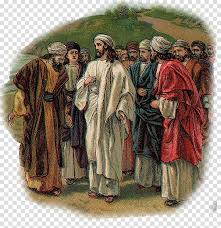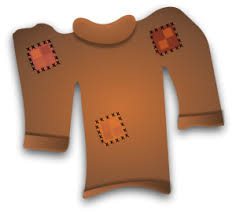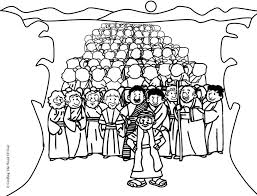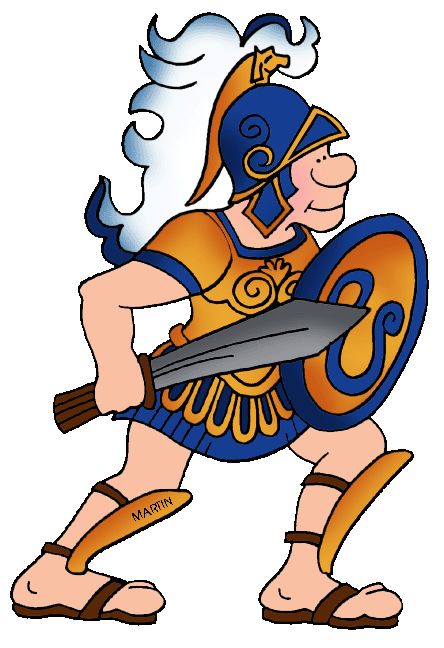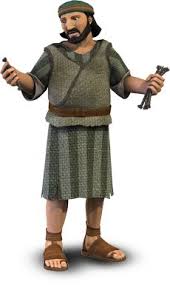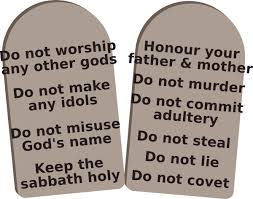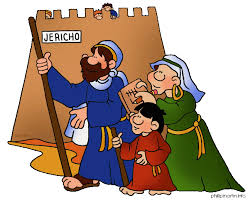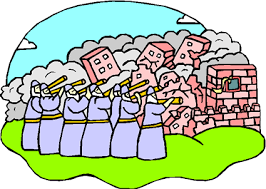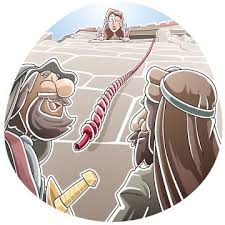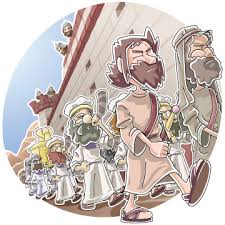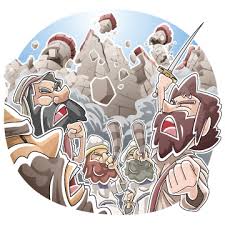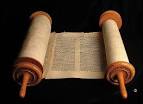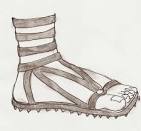Joshua 10:16 – These five kings fled and hid themselves in the cave at Makkedah.

The narrative of the Canaanite alliance now continues. As you recall, five of the kingdoms in Canaan (Jerusalem, Hebron, Jarmuth, Lachish, and Eglon) formed a military alliance against Israel. They were led by Adoni-zedek, king of Jerusalem.
Instead of directly attacking Israel, they decided to attack Gibeon, the new vassal state of Israel. There was some strategy to this maneuver. In their minds, there was a good chance that Israel wouldn't even come to fight, since the treaty with Gibeon was based on deceit. And even if Israel did show up, they couldn't defeat a five-army alliance. So either way, the five kings felt they had a good chance to win this battle and put a halt to the progress of Israel, who was pushing forward into the center of Canaan.
But Israel did honor their treaty with Gibeon. God instructed Joshua to take the fighting men and enter into battle against the alliance, for he was giving all five nations into the hands of Israel (Joshua 10:8).

As we would expect, God kept his promise! He sent a tremendous thunderstorm which put fear into the soldiers of the alliance. Once the battle started, and Israel was becoming the clear winner, the enemy soldiers turned and fled. At that moment, God rained hailstones upon them and they died. Scripture tells us that more died from the hailstones than from the swords of the men of Israel (Joshua 10:11).
Not surprisingly, the kings of the alliance also fled from the battle. Escaping both the swords of Israel and the hailstones from heaven, they took refuge in one of the many caves in the region near Makkedah.
I am sure the kings felt they would be safe in the cave; but there is no escaping from the eyes of God!
Jeremiah 23:24 – "Can any hide himself in secret places that I shall not see him?" says the LORD. "Do not I fill heaven and earth?" says the LORD.
The Lord knew exactly where these men were; indeed it was only by his sovereign hand that they were able to avoid death long enough to make it to the cave. But their respite was temporary; God was reserving them for a more public judgment and execution that he might show his power through the situation. This was the same thing we saw in Egypt when Pharaoh survived all ten plagues, only to die in the Red Sea (Exodus 9:16).
This brings up a point we don't want to miss: God is continually aware of where his children are, what they are facing and how they are doing. In Psalms 139, David tells us that God:
- Knows when we sit down and when we stand up.
- Knows our thoughts before we think them.
- Knows every word that is ever formed by our tongues.
- Saw us when we were still in our mother's womb.
- Knows the number of our days before we are born.
That Psalm goes on to say that there is no place in hell, heaven or on earth where God cannot find us; no matter where we are he is there to lead us and hold us:
Psalm 139:10 - Even there shall your hand lead me, and your right hand shall hold me.
What an encouraging thought! God loves us more than we can ever know! If you are facing a battle today or if you are feeling a little discouraged, please stop and read Psalms 139. It will take less than 5 minute and I guarantee it will become one of your favorite Psalms.
Remember, God sees you, he knows your trials and temptations, he is well aware of your burdens and he is there to help!
Joshua 10:17 – And it was told to Joshua, "The five kings have been found, hidden in the cave at Makkedah."
As the battle is winding down, Joshua apparently sent a detachment of men to scour the surrounding territory to look for any remaining stragglers that were not killed by the hail or by the swords of his men.
Israel wanted to find and slay these fugitives before they entered the safety of a walled city, where they could live to fight another day.
As they were passing through the area surrounding Makkedah, one of two things happened. Either the people of that town told them where the five kings were hiding, or the men of Israel found them as they searched the caves for fugitives. In any case, I am sure there was great joy when the kings were discovered!
Notice that the five kings were found together. It is highly unlikely that they would all flee to the same cave by chance. The implication is that they had a backup plan to save themselves should the battle go in Israel's favor. So at some point, they all fled together to a predetermined location, where they hoped to go undetected until they could flee to safety.
Joshua 10:18-19 – And Joshua said, "Roll large stones against the mouth of the cave and set men by it to guard them but do not stay there yourselves. Pursue your enemies; attack their rear guard. Do not let them enter their cities, for the Lord your God has given them into your hand."
In our prior post we saw that Joshua asked the Lord to cause the sun to stand still so that Israel had enough time/daylight to vanquish all her enemies. There would be time to deal with the kings later; for now a stone was rolled into place which effectively made their cave a jail cell.
Joshua then directs his men to continue pursuing the enemy troops of the alliance. Remember, Israel had been instructed that anytime the Lord delivered an enemy into their hands, they were to utterly destroy that foe:
Deuteronomy 7:1-2 - When the LORD your God shall bring you into the land to which you go to possess it, and has cast out many nations before you, �and when the LORD your God shall deliver them over to you; you shall strike them, and utterly destroy them; you shall make no covenant with them, nor show mercy unto them:
Since that was clearly the case in this conflict, Israel had a duty to track down as many remaining enemy soldiers as possible and kill them.
Joshua 10:20-21 – When Joshua and the sons of Israel had finished striking them with a great blow until they were wiped out, and when the remnant that remained of them had entered into the fortified cities, then all the people returned safe to Joshua in the camp at Makkedah. Not a man moved his tongue against any of the people of Israel.
Eventually, as night fell, the men of Israel returned to their camp at Makkedah. The text specifically states that ALL the men returned safely; none of them died or suffered an injury when fighting or chasing after their enemies.
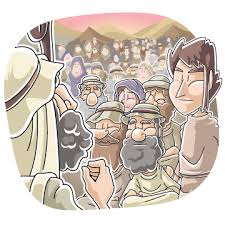
That is an amazing statement! Israel fought against an alliance of five highly trained, well equipped armies and not a single man died! Only God could make that happen!
Scripture also declares that 'not a man moved his tongue against any of the people of Israel'. A similar expression is noted in Exodus 11:7. In that verse, the author declares, 'against any of the children of Israel shall not a dog move his tongue.'
Both phrases are proverbial expressions which basically describe freedom from alarm and immunity from assault.
In other words, no person or nation was brave enough to challenge, threaten or accuse Israel after their victory. No one dared to cast any reproach upon them, to slander them or even to disagree with them. In fact, there was such a fear/respect for Israel among the Canaanites at that point, that not so much as a dog dared to bark at them!
Joshua 10:22-23 – Then Joshua said, "Open the mouth of the cave and bring those five kings out to me from the cave." And they did so, and brought those five kings out to him from the cave, the king of Jerusalem, the king of Hebron, the king of Jarmuth, the king of Lachish, and the king of Eglon.
The events of this verse undoubtedly occur the next day or even the day after that because it took time for the army to return after pursuing their enemies. Plus, after such a long battle, exhaustion and hunger were very real issues for the men. It was only after they had rested and recovered that they opened the cave and dealt with the kings of their enemies.
What do you think was going through the minds of the kings as they waited in the darkness of the cave?
Keep in mind, these were the first quiet moments they had for at least two days. As they reflected on the events of the last 48 hours, it must have seemed like they had stumbled into a nightmare!
Just the day before, they had been full of pride and confidence. They felt their alliance and its plans couldn't be defeated. They felt they had the upper hand. They were already having dreams of taking spoil, enlarging their territories and having their names recorded in history.
With great anticipation, they marched to Gibeon and set up camp. They spent the night eating, drinking, trash-talking and waiting for daybreak so they could overtake the citizens of Gibeon.
But the morning light did not bring the easy victory the kings were counting on – instead it revealed the armies of Israel who immediately burst upon them!
The attack was so unexpected, so sudden and so ferocious, there was no time to organize or prepare.

As the battle commenced, a storm of terrifying power broke over the battlefield. There was darkness, wind, rain, thunder and lightning. In vain the kings tried to shout instructions to their men, but no one could hear over the noise of the storm. The five kings watched in horror as confusion and pandemonium flowed through their armies.
As Israel gained the upper hand, those who had not been slaughtered literally turned and fled for their lives. There was nothing the kings could do to regain control of the situation, so they too turned and fled.
But even that did not stop the fear and terror of the Canaanites, for as soon as they fled, enormous hailstones fell from the heavens and killed more men that the sword! How was it possible that these hailstones from the heavens killed every Canaanite but spared every Israelite?
Desperately, the kings had prayed to the gods of the sun, moon and stars to hasten the coming of night so their men could escape. Surely their gods, whom they faithfully worshiped, would save them. But no - their gods were unwilling or incapable of helping them. As the hours passed, both the sun and moon stood still in the heavens as silent witnesses of the Canaanite's destruction.
As the kings sat in the darkness of the cave they must have been utterly astonished at how suddenly and completely their situation had changed. Just a few short hours ago, they were anticipating a complete annihilation of Israel, but now they were huddled in fear, hoping their own lives would be spared.
From Israel's point of view, the story was very different.
God had allowed the five kings to form the alliance, and he had directed Joshua to fight them. On the surface, it looked like a nearly impossible task. Israel had definite reasons to fear the alliance:
- The warriors of Canaan were experienced fighters, who were skilled and brave.
- Their numbers were huge.
- They were fighting on their own territory where they knew the terrain.
But God had assured Joshua of victory (Joshua 10:8). Israel was not to fear – God had given the entire alliance into their hands; they just needed to step out in faith and engage the enemy.
So Joshua, acting in faith, marched his army straight to Gibeon. There was nothing but surprise and fear in the eyes of their enemy; they were clearly not expecting Israel so soon. No sooner had the battle started when God showed up in a big way, with a massive storm. But the thunder and lightning which terrorized the Canaanites did not frighten them. Instead, a supernatural peace was upon the whole army and they fought together as a cohesive unit.
Their enemies, which just hours before had seemed so powerful and formidable, were now retreating in terror. As Israel began to pursue them, God rained down tremendous hailstones from the sky. Thousands of Canaanites had been killed by the stones, yet not a single man of Israel was injured. Hallelujah! God had kept his promises and come to the aid of his people yet again!
Even the five kings, who had been found in a cave, had been taken captive.
The bottom line is that God had suddenly and completely changed the fortunes of his people. What looked like a certain failure had turned into a victory of epic proportions. It was astonishing to experience/watch God bring down the enemies of his people so swiftly – in less than 48 hours.
Romans 8:31 - What shall we then say to these things? If God is for us, who can be against us?
The key was for God's people to keep their eyes on him, not on their circumstances.
What enemies are you facing today? Have you been called to a battle where your enemy seems bigger, stronger and better equipped than you? Does the situation look desperate? If so, remember this: If God is for you, no one can defeat you! Keep your eyes fixed on the Lord, stand on his word in faith, and watch for your victory to manifest!
Joshua 10:24 – And when they brought those kings out to Joshua, Joshua summoned all the men of Israel and said to the chiefs of the men of war who had gone with him, "Come near; put your feet on the necks of these kings." Then they came near and put their feet on their necks.
These events most likely occurred one or even two days after the battle. The stone was rolled away, and the five kings were led out to face Joshua, who commanded that they lay face down upon the ground.
The scripture tells us that all the men of Israel were present, obviously gathered as close to this scene as they could get. Then Joshua called the 'chiefs' forward. This refers to the lower or junior officers of the army - men who were the leaders during the actual battle. We might think of them as captains or sergeants.
Joshua then calls for the chiefs to form a line and one by one they were to literally place their feet upon the necks of these vanquished kings.
This was not a new or unique practice. Many Assyrian and Egyptian monuments depict their military heroes doing the same thing. However, they did it out of arrogance – as proof of their own superiority and strength.
But that was not the purpose in Israel's case. First, we notice that Joshua, the ultimate leader, did not place his feet upon the enemy. This reflects his modesty and speaks to the fact that God was the true leader of the nation.
Second, this was not for the glory of any one man. It was a purely symbolic action which represented the complete subjection of the people of Canaan to the nation of Israel. Or we could think of it this way: It represented Israel's certain and complete triumph over all their adversaries (Deuteronomy 33:29, Malachi 4:3).
II Samuel 22:40-41 – For thou hast girded me with strength to battle: them that rose up against me hast thou subdued under me. Thou hast also given me the necks of mine enemies, that I might destroy them that hate me.
It was very meaningful for the men of the nation to see this; it was an image of victory that their generation would never forget. It was also very meaningful for the chiefs to participate in the event; those who bore the brunt of the labor deserved to share in the fruit of it. This action would give them further strength and courage in the battles that Israel was yet to face.

Although victory was the most obvious lesson in this act, there were others too.
It was a reminder to Israel that God was sovereign, and his will always comes to pass. No matter how impossible the situation looks from man's point of view, God is well able to defeat his enemies.
It was also a reminder that the people of Israel were to execute the judgment of God exactly as he ordered. No one was to be spared based on their wealth, status, or job title. No one was spared out of pity. All were equal in the sight of God and all suffered the same judgment.
What principles can we find in this lesson that apply to our own lives?
First, remember that sin always brings ruin. The Canaanite kings rejected Jehovah. In fact, they were so arrogant they assumed they could easily conquer his people. Sin clouded their thinking and filled them with the vain delusion that they could be victorious when fighting against God himself! Then when things went wrong, they tried to hide themselves, not realizing that their sin will always find them out.
Numbers 32:23 - behold, you have sinned against the LORD: and be sure your sin will find you out.
The five kings thought they were safe within the dark confines of the cave, but it became their prison and eventually their grave. Sin promises the world, but only delivers death. Don't be deceived by it!
Second, those who remain faithful to God will at last see their enemies subdued. The warriors of Israel endured a long march and a bitter conflict. But in the end, they were able to put their feet upon the necks of their enemies.
As of right now, the church is also in a long and bitter conflict with the enemy of our souls. But in the end, God will place him under our feet just as surely as he did the five kings:
Romans 16:20 - And the God of peace shall bruise Satan under your feet shortly. The grace of our Lord Jesus Christ be with you. Amen.
Sometimes the battle seems to take forever, but don't give up! If we remain faithful and patient, God will reward us.
Joshua 10:25 – And Joshua said to them, Do not be afraid or dismayed; be strong and courageous. For thus the Lord will do to all your enemies against whom you fight."
These are the same words that God spoke to Joshua before Israel crossed the flooded Jordan River near Jericho.
The most exciting and perhaps significant words in this verse are 'your' and 'you'. They show that the Israelites were not to attribute their victory/success to Joshua or any divine favor resting upon him as an individual. As long as the nation served God faithfully, his divine presence would be with them no matter who was at the helm of the nation. And if they were on God's side, success was assured.
For their part, God's people are called upon to be strong and courageous/brave. The new covenant Christian is certainly to exhibit such graces as humility, meekness and forgiveness. But that does not mean we are to be walked over like door mats. We are to stand strong by resisting sin, conquering territory for God's kingdom and pulling down the strongholds of our enemy. Our goal is to win the world for Christ, which will take both courage and bravery.
Joshua 10:26-27 – And afterward Joshua struck them and put them to death, and he hanged them on five trees. And they hung on the trees until evening. But at the time of the going down of the sun, Joshua commanded, and they took them down from the trees and threw them into the cave where they had hidden themselves and they set large stones against the mouth of the cave, which remain to this very day.
As we have mentioned before, the Israelites did not hang people in the sense we think of it. They did not tie ropes around the necks of the five kings and drop them down so their necks broke.

Criminals (in this case the five kings) were killed in some other fashion, and their dead bodies were hung up for public display/disgrace/humiliation. They were generally hung up by the wrists, not the neck. The purpose was both to fulfill justice and to deter others from committing the same crimes.
Dead bodies which were hung up were never left overnight. There was really no benefit in doing so, because in the darkness of night, no one was looking upon the bodies as an example of justice or deterrence.
One day was enough to show people that justice had been executed and to admonish them to take heed. Besides, God had decreed that if a body was let up overnight, it would defile the land (Deuteronomy 21:23), and no one wanted that.
After throwing the bodies back into the cave, the entrance was filled with large boulders. This stood as a memorial to Israel of their victory over the alliance. It also prevented any remaining Canaanite soldiers from giving their kings an honorable burial.
Joshua 10:28-39 – As for Makkedah [and Libnah, and Lachish, and Eglon, and Hebron, and Debir] Joshua captured it on that day and struck it, and its king, with the edge of the sword. He devoted to destruction every person in it; he left none remaining. And he did to the king of Makkedah [and Libnah, and Lachish, and Eglon, and Hebron, and Debir] just as he had done to the king of Jericho.
We are going to look at verses 28-39 as a whole, because they are essentially the same. Once Israel had defeated the armies of the alliance, Joshua and his troops immediately moved forward in taking several more cities in Canaan.
These are the specific cities which were taken at that time: Makkedah, Libnah, Lachish, Eglon, Hebron and Debir.
In each case, Israel captured the city, killed its inhabitants (as commanded by the Lord), took everything else as plunder and set the place on fire.
The only other note in this history is found in verse 33, which tells us that the Horam, the king of Gezer, mustered his troops to go out and assist the king of Lachish. Scripture tells us that Israel killed all his people during the battle against Lachish; not one was left standing.
Incidentally, did you notice that two of the cities of the alliance (Jerusalem and Jarmuth) are not listed as being conquered by Israel?
We aren't entirely sure why that was the case. Some commentators speculate that Israel's army was so fatigued by all these battles that they simply couldn't fight any more. Others believe that Israel was simply satisfied with the progress they had made, and so they did not desire to go any further at that time.
If that was the case, they wasted a perfect chance to take those cities! As we know, Jerusalem was not taken until much, much later with a great amount of difficulty.
Joshua 10:40-41 – So Joshua struck the whole land, the hill country and the Negeb and the lowland and the slopes, and all their kings. He left none remaining, but devoted to destruction all that breathed, just as the Lord God of Israel commanded. And Joshua struck them from Kadesh-barnea as far as Gaza, and all the country of Goshen, as far as Gibeon.
The territory described in this verse is basically south of Jerusalem. Later, when the land is divided up into parcels and assigned to the various tribes, most of this land falls to Judah.
The significant part of this verse is that Joshua 'devoted to destruction' or killed every single Canaanite person because God had commanded him to do so.
Had Joshua taken it upon himself to order the massacre of thousands of people including women and children, we would rightly brand him a monster. No excuse could justify his cruel actions.
However, because he is performing the command of God, his actions are justified. And because it was a direct command of God, no one has the right to second guess this decision. Although it seems to us as if many of these people (including women and children) were innocent, we need to remind ourselves that we don't know the whole story. Only God knows the end from the beginning. Only he can see the thoughts and intents of the heart. He is the potter and human vessels of clay have no right to question his authority or the way he deals with the nations (Jeremiah 18:1-10, Romans 9:14-24).
Joshua 10:42 – And Joshua captured all these kings and their land at one time, because the Lord God of Israel fought for Israel.
The phrase 'at one time' refers to one military campaign or expedition, which probably lasted a few weeks.
These conquests were so rapid and so stupendous they cannot be attributed solely to the military cunning of Joshua or the valor of Israel's army. The main cause of these victories was the fact that God fought for Israel. Indeed, when we look at this chapter as a whole, it becomes very evident that only God could have made this happen.
We must remind ourselves that God has not changed; he is still the master of the heavens and earth. If we pray and ask for wisdom and strength to extend his kingdom in this generation, he will surely answer us:
Luke 11:9-10 - And I say unto you, Ask, and it shall be given you; seek, and you shall find; knock, and it shall be opened unto you. For every one that asks receives; and he that seeks finds; and to him that knocks it shall be opened.
If that is the case, why don't we see more results? Is it a lack of faith? Do we ask for things that are too small? Or are we more interested in obtaining the things of this earth rather than the things of heaven?
Joshua 10:43 – Then Joshua returned, and all Israel with him, to the camp at Gilgal.
At last, when the fierce battles were over, when the kings were subdued and their cities burned to the ground, the fighting men of Israel returned to their main camp at Gilgal.
 There they enjoyed a season of rest. The plunder was divided up among the nation. And most importantly, Israel returned to the tabernacle where they made sacrifices of worship and thanksgiving to God.
There they enjoyed a season of rest. The plunder was divided up among the nation. And most importantly, Israel returned to the tabernacle where they made sacrifices of worship and thanksgiving to God.As one commentator noted, 'When we have completed our victories over the powers of sin and Satan, we shall return, under the conduct of our divine Joshua, to our eternal rest in the camp of God'. Amen!
Let me offer you some encouragement and some relief:
In today's post we noted that the five kings tried to hide themselves in the darkness of a cave, but their efforts were in vain because God always knows where we are and what we are doing.
While that was bad news for the kings, it is encouraging news for us! God always knows where you are and what is happening with you. No one else may know or understand your situation but God does! Your current circumstances were filtered through him before they even touched you.
Remember, God never sets his children up to fail. Even though the situation seems dire, you can be assured that God has victory for you.
If you find yourself in circumstances that look hopeless, just remember that Israel probably felt the same way as they faced the alliance, but God didn't let them down. He gave them an epic victory which benefited them and brought glory to his name. He is more than capable of bringing you to your victory too, and giving you a testimony that will help others and bring him glory.
Let me offer you some strength:
I don't know about you, but I feel that when God tells us something, it must be important, right? If that is the case, how important would something be if God said it multiple times?
When we read through the scriptures, we find that God tells us over and over and over again not to fear our enemies or become dismayed by our circumstances.
Rather than looking directly at our circumstances, we need to see them through the 'glasses' or 'lenses' of God's word.
For instance, you may have been diagnosed with an illness. In the natural, that situation can look scary, expensive and even hopeless. But when you remember that God has already paid for your healing by the stripes he took during the crucifixion, suddenly that illness looks a lot smaller. Suddenly, it looks like an opportunity to for victory and a testimony. Rather than a defeat, it becomes a chance to give God glory on this earth.
The next time you face a battle in life, put your faith in God and his promises and remember not to be afraid or dismayed!
The same principle holds true for the church. For years our enemy has slowly been eradicating God from society. But enough is enough! Now is the time for the church to stand up and boldly push back/fight against the forces of evil in our culture.
We do not need to be afraid to do so, because we know that God fights on our behalf. He will give us victory in the battle, just as he gave ancient Israel victory over the kings of Canaan, if only we will step out in faith and go to war with him.









